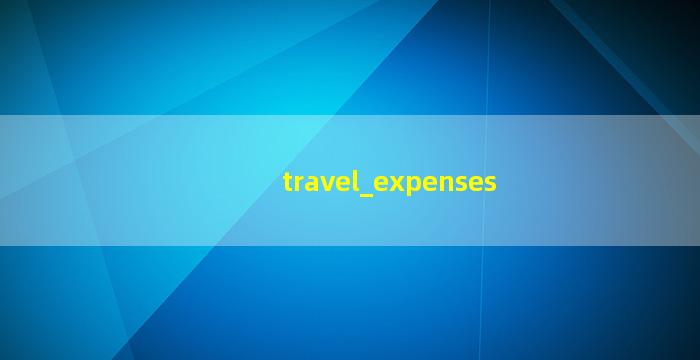旅游费用英文怎么写(旅游的费用用英语怎么说)
1、旅游费用英文怎么写
Travel Expenses in English
Traveling is an exciting way to explore new places and experience different cultures. However, it is important to consider the cost of your trip. In this article, we will learn how to express travel expenses in English.
When planning your trip, you need to consider the following expenses:
1. Accommodation:

Finding a place to stay is essential. There are various options such as hotels, hostels, or vacation rentals. Make sure to check prices and book in advance to get the best deal.
2. Transportation:

Getting around during your trip is another expense to consider. Whether you choose to travel by plane, train, taxi, or public transportation, it is important to factor in the cost of transportation tickets or fares.
3. Food and Drinks:

Food is an essential part of any travel experience. Consider the cost of meals, snacks, and drinks during your trip. It is always a good idea to try local cuisine, but also be mindful of your budget.
4. Attractions and Activities:

Visiting attractions and participating in activities is an exciting part of traveling. Whether it's museums, historical sites, or adventure sports, make sure to research and budget for these expenses.
5. Souvenirs and Shopping:

Don't forget to set aside some money for souvenirs and shopping. It's a great way to bring back memories from your trip and support local businesses.
6. Miscellaneous Expenses:
There may be unforeseen expenses that arise during your trip, such as tipping, visa fees, or travel insurance. It's always wise to have a little extra money set aside for any unexpected costs.
Remember, it is important to set a budget and stick to it while traveling. Being mindful of your expenses will help you better plan and enjoy your trip without overspending.
2、旅游的费用用英语怎么说
Travel Expenses in English
Traveling is a wonderful way to explore the world and immerse yourself in new cultures. However, it is important to plan ahead and consider the expenses involved. In this article, we will discuss how to talk about travel expenses in English.
When discussing travel expenses, it is essential to have a clear idea of your budget. You can use phrases such as:
- "What is your travel budget?" to ask about someone's planned spending.
- "I have a budget of $500 for accommodation" to express your own limit.
Next, let's look at some vocabulary related to travel expenses:
- Airfare: the cost of a flight.
- Accommodation: the cost of staying in a hotel, hostel, or other lodging.
- Transportation: the cost of getting around, including public transportation or renting a car.
- Meals: the cost of food and drinks during your trip.
- Attractions: the cost of visiting museums, landmarks, or other tourist spots.
It is also essential to be familiar with useful phrases for asking about prices:
- "How much does it cost to fly from London to Paris?"
- "What is the average price for a hotel room in this city?"
- "Are there any discounts available for students or seniors?"
Additionally, it is worth considering phrases for bargaining or negotiating prices:
- "Is there any room for negotiation?"
- "Can you offer a lower price if I book in advance?"
- "Are there any package deals or promotions?"
Lastly, keep in mind that unexpected expenses may arise while traveling, so it is helpful to have some extra funds set aside. It's always a good idea to be prepared for the unexpected.

To conclude, discussing travel expenses in English involves budgeting, asking about prices, and being prepared for unexpected costs. By familiarizing yourself with the relevant vocabulary and phrases, you will be better equipped to manage your expenses while enjoying your travels. Remember to plan ahead and have a memorable experience!
3、旅游费用英文翻译
Travel Expenses
Traveling is one of the most enriching experiences in life. It allows us to explore new places, embrace different cultures, and create lifelong memories. However, one aspect that often requires careful planning is the cost of traveling.

Transportation
Transportation expenses usually take up a significant portion of the travel budget. Whether it's the cost of flights, train tickets, or car rentals, it's essential to research and compare prices in advance. Booking in advance or taking advantage of travel deals can help reduce transportation costs.
Accommodation
Another major expense is accommodation. The cost of hotels or vacation rentals can vary greatly depending on the location, season, and level of comfort. It's essential to consider the needs of your trip and find accommodation options that fit your budget. Additionally, alternative options like hostels or homestays can provide a more affordable stay.
Meals and Drinks
Food expenses can add up quickly, especially if you're dining out for every meal. To manage costs, consider eating at local eateries or trying street food, which often offers an authentic culinary experience at a lower price. It's also wise to set a daily budget for meals and drinks to avoid overspending.
Activities and Attractions
Exploring the attractions and participating in activities is an integral part of any trip. However, entrance fees, guided tours, and adventure activities can significantly impact your travel budget. Researching free or low-cost attractions and seeking out discounts or combination deals can help save money while still enjoying the desired experiences.
Additional Expenses
Aside from the main expenses mentioned above, it's important to consider additional costs such as travel insurance, visa fees, and souvenirs. These additional expenses can quickly add up, so it's crucial to include them in your travel budget planning.
In conclusion, careful planning and budgeting are crucial when it comes to travel expenses. By researching and comparing prices, prioritizing your spending, and being flexible with your choices, you can make the most of your travel experience without breaking the bank.
4、旅行费用的英文
Travel Expenses in English
Travelling is an enriching experience that allows us to explore new cultures, landscapes, and cuisines. However, it is essential to plan our travel expenses to ensure that we have a budget-friendly trip. Here are some travel expenses in English to help you make the most of your journey while keeping your finances in check.

1. Transportation
Transportation costs are often a significant part of our overall travel expenses. Whether you are taking a flight, train, bus, or renting a car, it is crucial to factor in these costs beforehand. Make sure to compare prices, book in advance, and consider public transportation options to save money.
2. Accommodation
Finding suitable accommodation at a reasonable price is essential for most travelers. Look for options like hotels, hostels, or guesthouses that fit your budget and provide the desired level of comfort. Consider staying in more affordable locations or sharing accommodations with other travelers to save money.
3. Food and Dining
Exploring local cuisine is one of the highlights of any trip. However, dining out can quickly add up to your expenses. To manage your food budget, consider eating at local markets, food stalls, or budget-friendly restaurants. Another option is to cook your meals if you have access to a kitchen.
4. Attractions and Entertainment
Visiting popular attractions and engaging in entertainment activities often require additional expenses. Research the entry fees or ticket prices beforehand to plan your budget accordingly. Look for free or low-cost activities, such as exploring parks, hiking trails, or attending local festivals.
5. Miscellaneous Expenses
Miscellaneous expenses include souvenirs, travel insurance, visa fees, and any additional costs not classified in the above categories. Set aside a small amount for unexpected expenses or emergency situations.
By considering these travel expenses in English, you can have a better understanding of your overall budget and plan your trip accordingly. Remember to always research and compare prices, look for deals or discounts, and prioritize your spending to make your journey memorable and affordable.

.jpg)
.jpg)
.jpg)
.jpg)
.jpg)
.jpg)